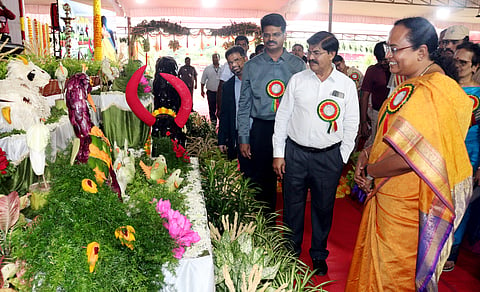

VELLORE: India’s food grain production must increase to 350 metric tonnes by 2030 to meet the escalating demand, said Collector V R Subbulakshmi, while inaugurating the two-day agricultural exhibition at VIT University here on Friday.
The university’s agriculture department, in collaboration with its Centre for Sustainable Rural Development and Research Studies , annually hosts ‘Uzhavar Kalanjiam,’ an agricultural exhibition and seminar. The 7th Annual Farmers’ Repository Programme is scheduled for August 30 and 31 at the campus with the theme ‘Technological Innovation in Agriculture’ focussing on ‘Agriculture in harmony with nature.’
The event featured over 130 exhibition stalls, aiming to promote technology-driven agriculture and organic farming in the districts of Vellore, Tiruvannamalai, Ranipet, Tirupattur, and other parts of Tamil Nadu. It was presided over by VIT Vice-Chancellor Dr G V Selvam.
Thiruvalluvar University Vice-Chancellor T Arumugam was also present.
The collector stressed the urgent need for advanced technologies to boost productivity, highlighting that India’s food grain production currently stands at 300 metric tonnes (approximately), but this figure must increase to 350 metric tonnes by 2030 to meet the escalating demand. She emphasised the need to integrate robotics and other advanced technologies in farming and ensure that these innovations are accessible to farmers.
“For the past seven years, VIT has played a crucial role in bridging the gap between technology and farmers. Only a few institutions like VIT engage with the farmers directly, demonstrating how these technologies can benefit them,” she said.
Dr G V Selvam pointed out the trend where constructing buildings seems more profitable than cultivating crops, and stressed the need to protect farmlands for future generations. Hence, VIT introduced an agriculture course to inspire the younger generation to take up farming, realising the Chancellor’s dream.